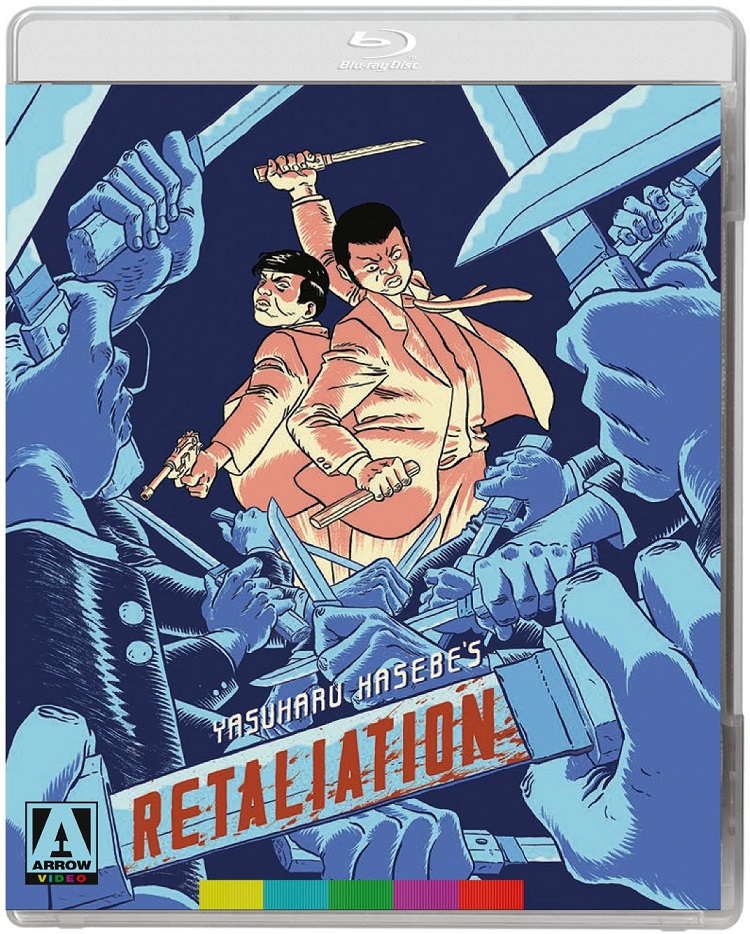
One of the joys of watching old exploitation movies like Retaliation is that the inexpensive filmmaking meant that a documentary approach had to be used to keep things cheap. Much of the movie is not on standing sets, but in real locations, with very shaky hand-held shots. The action can’t be over-choreographed (no time, no money) so the action is stylistically obscured, moving too swiftly and brutally for any of it to be seen clearly. Having things move in and out of frame and be obscured in camera is significantly more arresting, to my mind, than the shaky cam fake-handheld footage that has become a Western staple of bad action in the last couple of decades.
It also means that the movie serves as a kind of time capsule. This is late-’60s Japan in the flesh, with the fashions and the buildings of the time, right there in the lens. These movies tended to be made by real production companies who had real histories, and consummate professional crews, so even the cheap old Japanese movies look fantastic. Retaliation was made by Nikkatsu, which eventually moved entirely into the specific Japanese brand of softcore pornography alternatively termed Roman Porno (short for Romantic Pornography) or “pink” films for the s&m and violence themed movies.
Retaliation is a yakuza picture, so it’s about gangland terror, control of cities, and the tension between both the higher-class Yakuza family men and lowly street thugs, and between traditional “respect amongst gangsters” contrasted with modern semi-corporate ruthlessness. Just out of jail, Jiro (played by Akira Kobayashi, one of Nikkatsu’s big leading men) wants to get back into the family business – but most of his gang has been dispersed, and only the godfather and a single retainer are left. They’ve been taken care of by the Hasama family, and so out of gratitude Jiro goes to work for them. He’s assigned to take over gang activity in Ichikawa city, consolidating the local gangs and buying up land to sell to factory owners for a profit.
Of course, there’s betrayals, street brawls, violence and mayhem. The Aoba gang terrorizes a local family by kidnapping their daughter on the street, and assaulting her in their car. They don’t quite rape her (though, this being an exploitation movie, they do mostly strip her) but their intent is clear. The farmers come under the protection of the Aoba’s rivals the Tono family, whether they want it or not. Jiro sends men to infiltrate both gangs to get a war brewing – which means knife fights, running through the streets, and all kinds of fun gangster action.
It’s the kind of movie that has room for an interesting (if absurd) subplot about Jo Shishido, playing a gangster who wants revenge on Jiro for killing his brother in a gangfight. After an unsuccessful attempt on Jiro’s life, he’s taken in by the gangsters to be Jiro’s right-hand man, so they can make sure he doesn’t make any more complications for Jiro while he’s taking over the city. After that, he can try to kill him all he likes. Do they have a pitched battle almost to the death, and end up best friends by the end of the movie? You know the answer if you’ve ever seen one of these.
There are hints of a larger theme in the story, with the new gangs fighting in underhand ways the old ones wouldn’t countenance, and the corporate factories destroying farming villages for “progress”, but it’s not too heavy handed, nor too substantial. The point is the fights, the intrigues, and the images. There’s a knife fight in the rain. Guns are used in only a couple occasions – these gangsters all seem to prefer knives and swords. There’s a scene demonstrating the nastiness of the local gangsters by having them force a prostitute to be tied up against her will, but the camera isn’t shy about lingering on her tied up hands and bare back for a long leer. A softcore sex scene turns into a brutal gang rape. There’s various levels of exploitation nastiness.
For a cineaste looking to learn something about Japanese filmmaking and culture, much of Retaliation would probably be called “problematic.” The director Yasuharu Hasebe (also responsible for the recent Arrow release of Massacre Gun) has a deliberate style in this film, interspersing locked-down traditional compositions with hyperactive hand-held shots. There’s a knife fight in the Tokyo Streets that looks like it was done in the middle of an unknowing crowd (I have no way of knowing if this is the case, and I might be wildly misapprehending the shot – but it sure looks neat and natural.) The soundtrack sounds like it’s played on the middle ground between a Japanese Koto and the heavily-reverbed baritone guitars of an Ennio Morricone western soundtrack.
What it lacks is modern pacing, modern structure. Retaliation is not a movie made for the ages, nor for the enervating scrutiny of the cineaste. It plays out in episodes, looks good, and has all the right elements for a fun two-fisted gangster story.
On this Blu-ray release (which has the film looking as good as it probably ever has or will in a home release) two extras are included, a short interview with Joe Shishido, who is old and amusing, and a lengthier interview with film historian Tony Rayns which provides a handy context for the film and its creators.